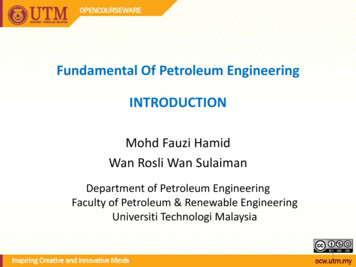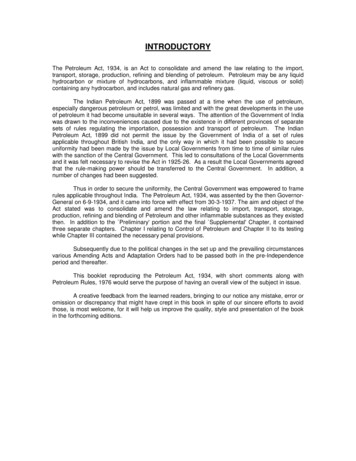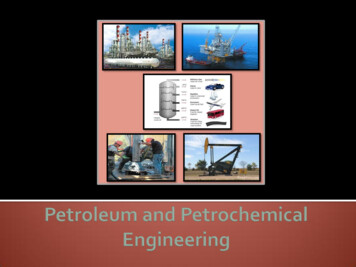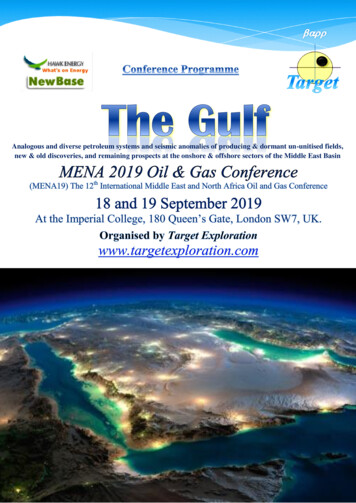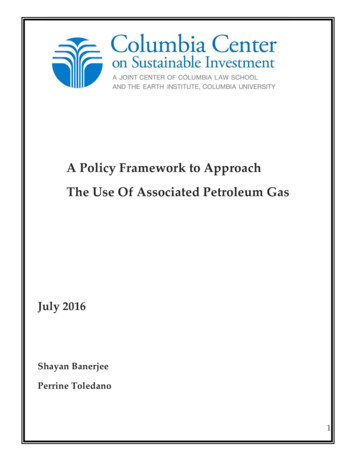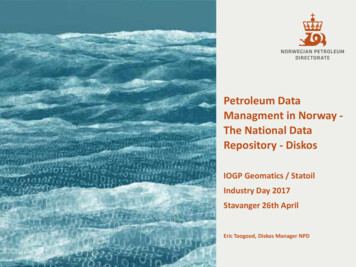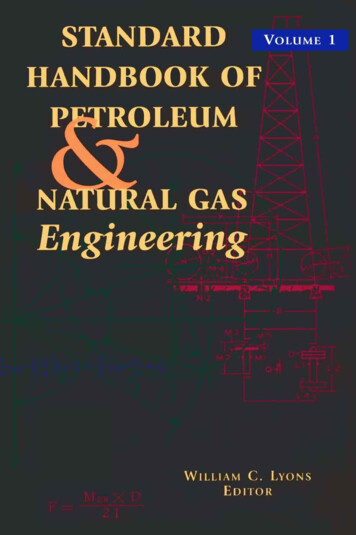
Transcription
Objective Questions inPetroleum EngineeringPUBLISHING(Important Multiple Choice Questions with Answers)Dr. Vikas MahtoKHANNAAssociate ProfessorDepartment of Petroleum EngineeringIndian School of Mines, Dhanbad-826004 (India)
INGPrice : 295.00ISHObjective Questions in Petroleum EngineeringDr. Vikas MahtoPUBLCopyright Khanna Book Publising Co. (P) Ltd.KHANNAThis book is sold subject to the condition that it shall not, by way of trade or otherwise,be lent, resold, hired out, or otherwise circulated without the publisher’s priorconsent in any form of binding or cover other than that in which it is published andwithout a similar condition including this condition being imposed on the subsequentpurchaser and without limiting the rights under copyright reserved above, no partof this publication may be reproduced, stored in or introduced into retrieval system,or transmitted any form or by any means (electronic, mechanical, photocopying,recording or otherwise), without the prior written permission of both the copyrightowner and the above mentioned publisher of this book.ISBN: 978-93-82609-80-3Edition: 2016Published by:KHANNA BOOK PUBLISHING CO. (P) LTD.4C/4344, Ansari Road, Darya Ganj, New Delhi-110 002Phone: 011-23244447-48 Mobile: 91-9910909320E-mail: contact@khannabooks.comTypeset and Cover Design by:Book One Graphics, New DelhiPrinted in India by:India Book Printers & Binders, Delhi
PrefaceKHANNAPUBLISHINGThis book contains numerous important questions which have beenmethodically prepared/selected from different text books, manuals ofpetroleum industries, SPE technical papers and teaching materials ofdistinguished persons. These questions are very relevant for promotingfundamental understanding of petroleum engineering. The various topicscovered in this book are petroleum exploration, oil & gas well drilling,reservoir engineering, offshore oil & gas operations, petroleum productionengineering, oil & gas well testing, enhanced oil recovery techniques,health, safety & environment in petroleum industries, and latest trends inpetroleum industry. It contains objective type theoretical and numericalquestions based on basic concepts & latest trends in the petroleumexploration and production industries.This book will be primarily useful for fresh graduates of petroleumengineering who can prepare themselves soundly for both written as wellas oral examinations. At the same time this can be used as readily availablehandbook for quick reference by practicing engineers. There is no othercomprehensive book available of this format in petroleum engineeringdiscipline which can build basic concepts of all the important courses ofpetroleum engineering.I would like to acknowledge the head of the department for his kindsupport. I also wish to acknowledge the contribution of Mr. Rajat Jain,Senior Research Fellow, who has helped in typing the contents of this book.I shall greatly appreciate being informed of suggestions for theimprovement of the book.VIKAS MAHTO
ANANKHINGHISPUBL
About the AuthorKHANNAPUBLISHINGDr Vikas Mahto is an Associate Professor in the Petroleum Engineering Department of Indian School of Mines Dhanbad, India. He has received his Ph.D.Degree in Petroleum Engineering from Indian School of Mines Dhanbad in2004. He is having more than 12 Years of Experience in the field of ChemicalEngineering and Petroleum Engineering. He is the author of more than 100technical papers in different national/international journals & conferencesof repute. He has completed three research projects sponsored by UGC-ISM,UGC New Delhi and CSIR New Delhi and currently working on collaborativeR&D project with Oil India Ltd, Duliajan, Assam. He has filed two Indian patents in his name. Two students have awarded their Ph.D. Degree in petroleumEngineering under his supervision and eight students are pursuing their Ph,D.work under his guidance. He is the reviewer and member of editorial boards ofmany national and international journals.
ANANKHINGHISPUBL
ContentsPrefaceiiiv1.Petroleum Exploration12.Oil and Gas Well Drilling Technology3.Reservoir Engineering4.Petroleum Production Operations-I5.Petroleum Production Operations-II6.Offshore Drilling and Production Practices1587.Petroleum Formation Evaluation1778.Oil and Gas Well Testing1919.Health Safety and Environment in Petroleum IndustriesNAPUBLISHINGAbout the Author19518111920722911. Unconventional Hydrocarbon Resources243KHAN10. Enhanced Oil Recovery Techniques
ANANKHINGHISPUBL
CHAPTER1Petroleum Exploration1. Which of the following rock favors petroleum formation?a) Sedimentary rockb) Igneous rocka) Cross beddingc) Metamorphic rockINGb) Graded beddingd) None of the abovec) Both (a) and (b)d) None of the aboveH2. Which of the following is a typeof sedimentary rock?6. A source rock that is too immature to generate petroleum inits natural setting is known asISa) Organic rockPUBLb) Chemical rockc) Clastic rocka) Potential source rockd) All of the aboveb) Effective source rockANNA3. The set of processes transforming sediment into rocks is calleda) Lithificationwhich the coarsest particles areconcentrated at the bottom andgrade gradually upward intofine silt is known asb) HydrolysisKHc) Cementingd) None of the above4. The formation of bed createdby wind that changes directionand the layers meet at differentangles is known asa) Cross beddingb) Graded beddingc) Both (a) and (b)d) None of the above5. The formation of horizontal ornearly horizontal layers of bedat the time of deposition, inc) Both (a) and (b)d) None of the above7. A source rock that has alreadyformed and expelled petroleumto a reservoir is known asa) Potential source rockb) Effective source rockc) Both (a) and (b)d) None of the above8. Which of the following is mostabundant sedimentary rockfound in the earths’s crust?a) Sandstoneb) Shalec) Limestoned) None of the above
2 : : Objective Questions in Petroleum Engineering9. Which of the following is notamong the basic type of organicmatters in sediments?a) Type Ia) Low permeabilityb) High permeabilityc) High porosityd) Both (b) and (c)b) Type IIIc) Type V15. Which of the following is trueabout primary porosity?d) Type IV10. Which of the following type oforganic matters in sedimentsinclude ancient oil shales of marine origin?a) Remains in place afterdeposition and pores areconnectedb) Part of the rock is dissolvedafter deposition.c) Pores are not connectedb) Type IId) None of the aboveINGa) Type Ic) Type III16. Which of the following is trueabout secondary porosity?a) Type Ib) Type IIANNAc) Type IIId) Type IVa) Part of the rock is dissolvedafter deposition and poresare not connectedPUBL11. includes the principlesource sediments for oil.ISHd) Type IVKH12. Which of the following is a important method for geochemical exploration of oil?a) Geothermal surveyb) Radioactivity Surveyc) Both (a) and (b)d) None of the above13. Oil and gas are found ina) Shaleb) Sandc) Granited) Sulfur14. Reservoir rock containing petroleum hasb) Remains in place afterdeposition and pores areconnectedc) Both (a) and (b)d) None of the above17. Which of the following is a typeof primary porosity?a) Intercrystalline porosityb) Moldic Porosityc) Intraparticle porosityd) None of the above18. Which of the following is a typeof secondary porosity?a) Intergrannular porosityb) Intraparticle porosityc) Intercrystalline porosityd) None of the above
Petroleum Exploration 1 2. Oil and Gas Well Drilling Technology 19 3. Reservoir Engineering 51 4. Petroleum Production Operations-I 81 5. Petroleum Production Operations-II 119 6. Offshore Drilling and Production Practices 158 7. Petroleum Formation Evaluation 177 8. Oil and Gas Well Testing 191 9. Health Safety and Environment in Petroleum .

